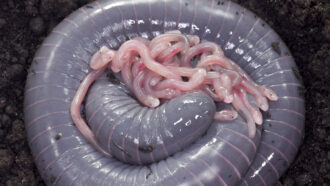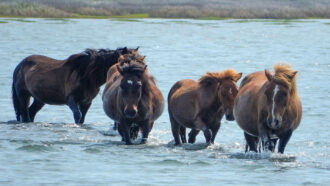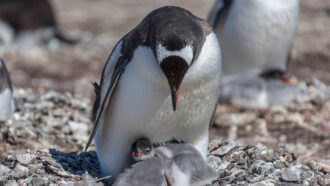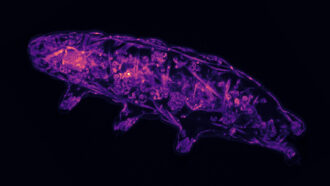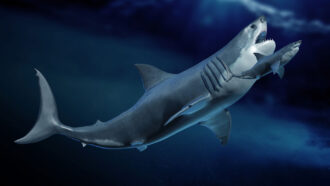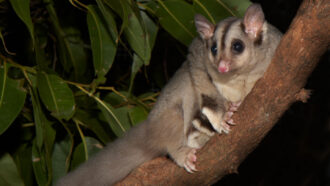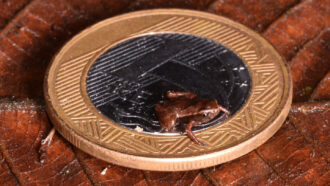Sleepless at Sea
Some marine moms and babies stay awake for weeks after the infants are born.
By Emily Sohn
Wouldn’t it be great to stay up all night without feeling tired the next day?
Orca-whale and dolphin babies and moms are champions of sleeplessness. They stay awake for a month after the babies are born—without showing any ill effects. And they don’t even need extra sleep later on to make up for the loss.
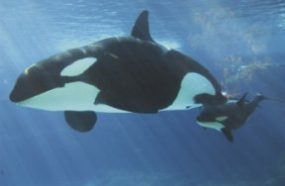 |
|
An orca mother and her newborn pup may not sleep at all for several weeks before getting into a normal sleeping pattern. |
| SeaWorld, San Diego |
Oleg Lyamin of the University of California, Los Angeles studies marine mammals such as orcas and dolphins. He discovered these animals’ unusual sleep habits by watching orca Kasatka and her baby Nakai at SeaWorld, San Diego, just after Nakai was born.
Kasatka and Nakai swam around their pool 24 hours a day, instead of floating motionless and closing their eyes the way that other adult orcas do when they sleep. Adults typically sleep for 5 to 8 hours.
Lyamin and his fellow researchers visited dolphin moms and babies at the Utrish Dolphinarium in Russia to see if they did the same thing. Dolphins are strange sleepers to begin with. A dolphin snoozes with only one-half of its brain at a time, closing one eye and either floating or swimming. But mother and newborn dolphins didn’t even sleep that much. Instead, they kept both eyes open and swam around constantly.
No other mammal has ever been found to sleep so little for so long. Moreover, most mammal babies, including those of humans, typically need much more sleep than adults do. In contrast, Nakai and the dolphin infants needed even less sleep than their moms.
Both mother and baby whales and dolphins gradually increased their sleep to normal adult levels over a period of months.
Scientists who study sleep are surprised by the findings. Other animals, such as rats, get sick or die if they’re deprived of sleep. Many researchers have argued that people and animals need sleep in order to learn, just as students in school need a good night’s rest after studying to do well on an exam. Babies in particular need sleep so that their brains can develop.
Both orcas and dolphins are intelligent animals with large brains. Because orca and dolphin babies don’t seem to doze at all while their brains are growing, they must not need sleep for learning or brain development, argues Jerry Siegel, who worked with Lyamin. He suggests that sleep serves other, as yet unknown, roles in mammals.
It’s also possible that orcas and dolphins have evolved special ways to develop and learn without sleep. Or, these marine mammals may simply have an unusual form of “sleep-swimming.” It’d be like a sleepwalker who goes to the kitchen, opens the refrigerator, and grabs a snack while brainwave recordings would show he or she is in a deep sleep.
Why do orcas and dolphins need to remain constantly active after a baby is born? Maybe they need to stay active to survive, Siegel says.
First, newborns need to breathe every 30 seconds, and mothers help push their babies to the surface to breathe, Siegel says. Secondly, baby whales and dolphins haven’t yet developed the thick blubber coat that protects them against the cold ocean waters when they’re older. Staying active may help keep them warm.
Don’t try to copy the sleeping feats of orcas and dolphins at home, researchers warn. Scientists may someday learn how to help people skimp on sleep. For now, though, people still have to snooze at least 8 hours a night to stay healthy.—N. Moreira
Going Deeper:
Moreira, Naila. 2005. Sleepless in SeaWorld: Some newborns and moms forgo slumber. Science News 168(July 2):3. Available at http://www.sciencenews.org/articles/20050702/fob1.asp .
Additional information about sleep and newborn orcas and dolphins can be found at newsroom.ucla.edu/page.asp?RelNum=6274 (University of California, Los Angeles).
McDonagh, Sorcha. 2004. Sleep lessons from sparrows. Science News for Kids (July 28). Available at http://www.sciencenewsforkids.org/articles/20040728/Note3.asp .
Netting, Jessa. 2004. Sea otters, kelp, and killer whales. Science News for Kids (March 24). Available at http://www.sciencenewsforkids.org/articles/20040324/Feature1.asp .
Sohn, Emily. 2005. Awake at night. Science News for Kids (May 4). Available at http://www.sciencenewsforkids.org/articles/20050504/Note2.asp .
______. 2005. Whale watch. Science News for Kids (March 23). Available at http://www.sciencenewsforkids.org/articles/20050323/Feature1.asp .
______. 2005. Sleep affects a bird’s singing. Science News for Kids (Feb. 23). Available at http://www.sciencenewsforkids.org/articles/20050223/Note3.asp .
______. 2004. Noisy boats may bother orcas. Science News for Kids (May 5). Available at http://www.sciencenewsforkids.org/articles/20040505/Note2.asp .
